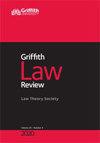Where ordinary laws fall short: ‘riverine rights’ and constitutionalism
IF 0.9
Q1 LAW
引用次数: 9
Abstract
ABSTRACT Laws that recognise rivers and their ecosystems as legal persons or subjects with their own rights, duties and obligations have been associated with theories of environmental constitutionalism. However, the extent to, and manner in which, constitutional law (with its elevated status) has been instrumental in the conferral of these ‘riverine rights’ is still not well-understood. In this article, we consider the constitutional relevance of the recognition of rivers as legal persons or subjects in Aotearoa New Zealand, Colombia and India. We argue that in these three countries riverine rights are constitutional experiments: as small-scale, ad hoc and ultimately incomplete attempts to transcend seemingly ineffective regulatory frameworks for rivers. However, they are also incremental, and influential, steps in a broader project of more fundamental social and environmental reform.普通法律的不足之处:“河流权利”和宪政
摘要承认河流及其生态系统为具有自身权利、义务和义务的法人或主体的法律与环境宪政理论相联系。然而,宪法(具有崇高地位)在多大程度上以及以何种方式在授予这些“河流权利”方面发挥了重要作用,目前尚不清楚。在这篇文章中,我们考虑了新西兰、哥伦比亚和印度承认河流为法人或主体的宪法相关性。我们认为,在这三个国家,河流权利是宪法实验:作为超越看似无效的河流监管框架的小规模、临时和最终不完整的尝试。然而,在更根本的社会和环境改革的更广泛项目中,它们也是渐进的、有影响力的步骤。
本文章由计算机程序翻译,如有差异,请以英文原文为准。
求助全文
约1分钟内获得全文
求助全文

 求助内容:
求助内容: 应助结果提醒方式:
应助结果提醒方式:


